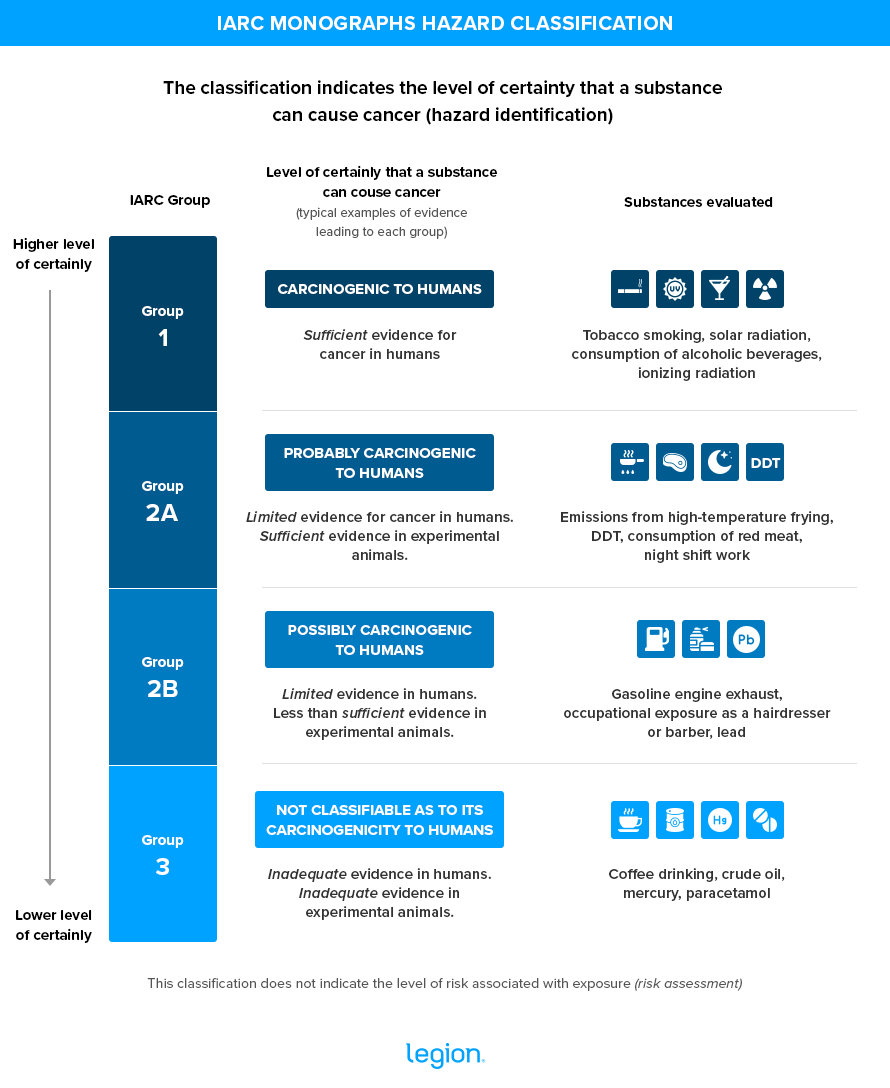“Aspartame causes cancer.”
At least, that’s what several major news organizations across the United States reported after the World Health Organization (WHO) announced it’s adding the artificial sweetener, found in foods and beverages such as diet soda, chewing gum, and pre-packaged desserts, to its list of possible carcinogens.
This sounds concerning. But is it worth worrying about?
Can aspartame cause cancer?
Here’s a more nuanced look at the association between aspartame and cancer.
The WHO’s Classification System
The WHO uses three groups to categorize substances and behaviors that may or may not cause cancer:

Group 3 includes things not considered carcinogenic to humans such as coffee, paracetamol (Tylenol), and mercury (though, of course, mercury is unhealthy for other reasons).
Group 2 is divided into 2 sections: 2A and 2B.
Group 2B contains things that are “possibly” carcinogenic to humans, including engine exhaust fumes, substances you might encounter in a hair salon, and lead.
Group 2A contains things that are “probably” carcinogenic to humans, including red meat, shift work, and emissions from high-temperature frying.
And Group 1 contains things that we know cause cancer in humans. In this group, you find the usual suspects: smoking, drinking alcohol, UV radiation, and so forth.
The WHO is placing aspartame in Group 2B. Thus, according to the WHO’s assessment, aspartame is about as likely to increase your cancer risk as aloe vera, carpentry, and eating pickled vegetables.
In other words, if you aren’t concerned that eating a jar of beets or woodwork will increase your cancer risk, you probably shouldn’t be overly troubled by aspartame sweetener.
Likewise, if you’re happy to drink hot drinks, eat steak, and use cobalt-containing devices like smartphones, you shouldn’t fret about aspartame, since all of these are more likely to cause cancer, according to the WHO.
Research On Cancer and Aspartame
Most research shows aspartame doesn’t increase cancer risk.
There are studies that report otherwise, though there are a variety of reasons not to be overly concerned.
For example, in a 2022 study conducted at Sorbonne Paris Nord University, researchers investigated the link between artificial sweeteners and cancer.
They found that aspartame increased cancer risk by 15%. Importantly, this was a relative increase, not an absolute increase. That is, if you had a 5% chance of developing cancer, regularly eating aspartame increased your risk to 5.75%, not 20%.
While we shouldn’t dismiss it outright, this increase is modest, especially when compared to other common lifestyle factors like excessive alcohol consumption or carrying excess body weight.
The researchers also found that “low” aspartame consumers showed higher rates of cancer compared to “high” consumers. This contradicts the usual “dose-response relationship” we expect when a substance is truly carcinogenic, where higher consumption increases risk.
This inconsistency hints that confounding variables—other factors intertwined with aspartame consumption that could be contributing to the increase in cancer risk—are, in fact, to blame.
As the study’s authors noted, those who regularly consume aspartame often exhibit other behaviors that likely increase cancer risk, such as smoking, leading a sedentary lifestyle, having diabetes, and eating a diet low in fruits, vegetables, and whole grains.
Hence, it’s likely that the increased risk may be more reflective of a broader lifestyle pattern than a direct consequence of consuming the sweetener itself—a perspective supported by other robust research.
Conclusion
Regardless of recent media reports, there’s little reason to be concerned about aspartame’s effect on cancer risk.
The WHO is categorizing aspartame among its lowest-risk potential carcinogens, a decision that seems largely precautionary, given that studies recognized by the Food and Drug Administration, the Expert Committee on Food Additives, and the International Agency for Research on Cancer have yet to find a substantial correlation between aspartame consumption and an increased cancer risk.
Thus, don’t let media hype mislead you.
Provided you adhere to the acceptable daily intake, aspartame likely won’t pose a significant health risk.
Scientific References +
- Fulgoni, Victor L., and Adam Drewnowski. “No Association between Low-Calorie Sweetener (LCS) Use and Overall Cancer Risk in the Nationally Representative Database in the US: Analyses of NHANES 1988-2018 Data and 2019 Public-Use Linked Mortality Files.” Nutrients, vol. 14, no. 23, 22 Nov. 2022, p. 4957, pubmed.ncbi.nlm.nih.gov/36500986/, https://doi.org/10.3390/nu14234957. Accessed 6 Apr. 2023.
- Debras, Charlotte, et al. “Artificial Sweeteners and Cancer Risk: Results from the NutriNet-Santé Population-Based Cohort Study.” PLOS Medicine, vol. 19, no. 3, 24 Mar. 2022, p. e1003950, journals.plos.org/plosmedicine/article?id=10.1371/journal.pmed.1003950, https://doi.org/10.1371/journal.pmed.1003950.
- Kunzmann, Andrew T., et al. “The Association of Lifetime Alcohol Use with Mortality and Cancer Risk in Older Adults: A Cohort Study.” PLOS Medicine, vol. 15, no. 6, 19 June 2018, p. e1002585, https://doi.org/10.1371/journal.pmed.1002585.
- Rapp, K, et al. “Obesity and Incidence of Cancer: A Large Cohort Study of over 145 000 Adults in Austria.” British Journal of Cancer, vol. 93, no. 9, Oct. 2005, pp. 1062–1067, dx.doi.org/10.1038%2Fsj.bjc.6602819, https://doi.org/10.1038/sj.bjc.6602819. Accessed 25 Mar. 2022.
- Palomar-Cros, Anna, et al. “Consumption of Aspartame and Other Artificial Sweeteners and Risk of Cancer in the Spanish Multicase-Control Study (MCC-Spain).” International Journal of Cancer, vol. 153, no. 5, 1 Sept. 2023, pp. 979–993, pubmed.ncbi.nlm.nih.gov/37323037/, https://doi.org/10.1002/ijc.34577. Accessed 17 Aug. 2023.










